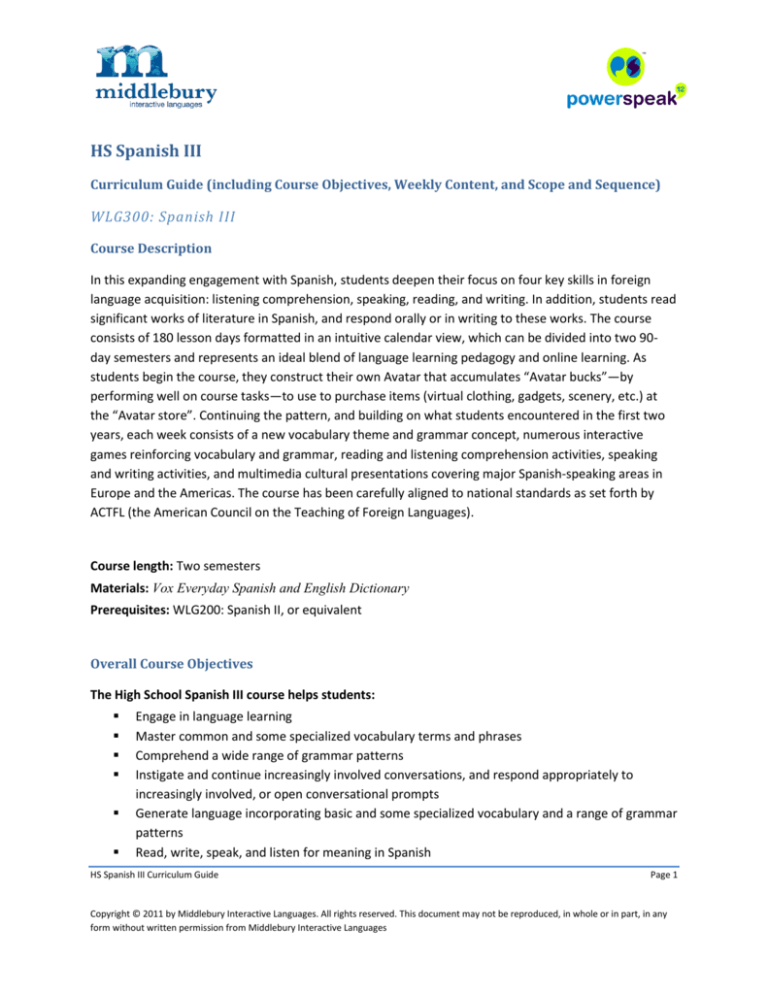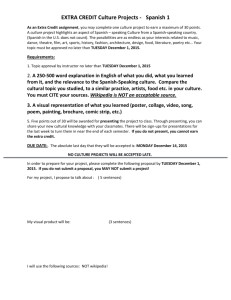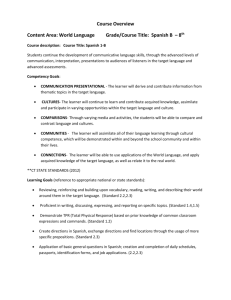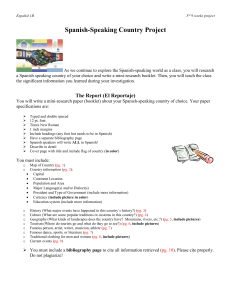
HS Spanish III
Curriculum Guide (including Course Objectives, Weekly Content, and Scope and Sequence)
WLG300: Spanish III
Course Description
In this expanding engagement with Spanish, students deepen their focus on four key skills in foreign
language acquisition: listening comprehension, speaking, reading, and writing. In addition, students read
significant works of literature in Spanish, and respond orally or in writing to these works. The course
consists of 180 lesson days formatted in an intuitive calendar view, which can be divided into two 90day semesters and represents an ideal blend of language learning pedagogy and online learning. As
students begin the course, they construct their own Avatar that accumulates “Avatar bucks”—by
performing well on course tasks—to use to purchase items (virtual clothing, gadgets, scenery, etc.) at
the “Avatar store”. Continuing the pattern, and building on what students encountered in the first two
years, each week consists of a new vocabulary theme and grammar concept, numerous interactive
games reinforcing vocabulary and grammar, reading and listening comprehension activities, speaking
and writing activities, and multimedia cultural presentations covering major Spanish-speaking areas in
Europe and the Americas. The course has been carefully aligned to national standards as set forth by
ACTFL (the American Council on the Teaching of Foreign Languages).
Course length: Two semesters
Materials: Vox Everyday Spanish and English Dictionary
Prerequisites: WLG200: Spanish II, or equivalent
Overall Course Objectives
The High School Spanish III course helps students:
Engage in language learning
Master common and some specialized vocabulary terms and phrases
Comprehend a wide range of grammar patterns
Instigate and continue increasingly involved conversations, and respond appropriately to
increasingly involved, or open conversational prompts
Generate language incorporating basic and some specialized vocabulary and a range of grammar
patterns
Read, write, speak, and listen for meaning in Spanish
HS Spanish III Curriculum Guide
Page 1
Copyright © 2011 by Middlebury Interactive Languages. All rights reserved. This document may not be reproduced, in whole or in part, in any
form without written permission from Middlebury Interactive Languages
Recognize and respond to significant works of literature in Spanish
Analyze and compare cultural practices, products, and perspectives of various Spanish-speaking
countries
Regularly assess progress in proficiency through quizzes, tests, and speaking/writing submissions
Weekly Content
Vocabulary Theme
o Each week presents a new set of vocabulary words through various self-correcting
activities. A printable vocabulary list, which includes pronunciation, is also provided.
Grammar Concept
o Each week introduces a new grammatical pattern. The concept is introduced through
sentence comparisons and presented in a printable explanation of the pattern.
Reinforcement Activities
o A range of interactive games (incrementally increasing in challenge) helps students
reinforce vocabulary and grammar concepts. These activities may be completed
multiple times so that students can better retain and apply the new information.
Students accumulate “Avatar bucks” by performing well on these and other interactive
challenges.
Presentation of Culture through Culture Videos
o Each week students learn about various cultural aspects (e.g. practices, products, and
perspectives) of a Spanish-speaking country. Culture videos present students with short
video explanations about cultural aspects of various Spanish-speaking countries from a
native of that country.
“Out of Seat” Activities
o Several times during the year, students are given opportunities to use the language
“outside” the course. These are specific assignments directing students to interact in a
genuine way with the Spanish language or Spanish-speaking cultures.
Realia
o Several times during the year, students work to decipher the key messages and
significant details in Realias. In Realias, students confront authentic or semi-authentic
texts in real-world, everyday situations. These encounters are neither trivial, nor far
beyond a student's comprehension level, but are texts to which students can respond
and that move them to a deeper understanding of the target language and culture at
the same time. Sample texts include recipes, student class schedule, newspaper
advertisements, etc.
Oral and Written Activities
o Each week, students complete oral and written activities. These activities give students
a chance to become more familiar with the speaking and writing patterns of Spanish by
applying them in communicative situations.
Literature Highlights
o Approximately every other week, students read and respond (in speaking or writing) to
a significant work of Spanish literature (typically from the AP Spanish Literature list)
Listening and Reading Comprehension Activities
o Each week contains either a focused reading comprehension activity, or a listening
comprehension activity. These activities help students to develop listening and reading
comprehension skills. They are based on the vocabulary, grammar, and/or culture
HS Spanish III Curriculum Guide
Page 2
concepts presented that week, and follow up assessments challenge students to identify
the main ideas and significant details of these rich texts based on everyday
communicative situations.
Assessments
o Culture comprehension quizzes verify that students have captured facts and
understandings from the cultural presentations.
o Focused Listening or Reading quizzes verify that students comprehend the main ideas or
significant details of target passages or conversations.
o End-of-week quizzes assess students’ mastery of the vocabulary words and grammar
concept presented that week, and include an oral or written assessment.
o Literature Highlights verify that students recognize main ideas and important details and
can respond to significant works in Spanish literature.
o Midterm and Semester Exams assess students’ mastery of the semester’s contents up to
their current place on the calendar, and include oral and written assessments.
Course Scope and Sequence
Semester 1
Vocabulary Topic
Grammar Pattern
Culture
Week 1
Family
Nouns, Pronouns
Mexico
Week 2
Countries and Nationalities
Adjectives
Mexico
Week 3
Numbers, Colors, and Shapes
Possessive Pronouns and
Adjectives
Mexico
Week 4
Telling Time
Demonstratives
Mexico
Week 5
Question words and Negative
words
Object Pronouns
Spain
Week 6
Descriptions
Adverbs
Spain
Week 7
Food
Present Tense Regular Verbs
Spain
Week 8
Body Parts and Medical
Words
Present Tense Irregular Verbs
Spain
Week 10
The Office
Personal ‘a’
Colombia
Week 11
Computers and Internet
Reflexive Verbs
Colombia
Vocabulary Topic
Week 12
School
HS Spanish III Curriculum Guide
Grammar Pattern
Por and Para
Culture
Colombia
Page 3
Week 13
Calendar and Holidays
Gustar
Colombia
Week 14
Around the House
Impersonal “se”
Cuba
Week 15
Chores
Ser and Estar
Cuba
Week 16
Sports and Leisure
Saber/Conocer and
Pedir/Preguntar
Cuba
Week 17
Hobbies and Pastimes
Haber and Hacer Expressions
Cuba
(Week 9 and 18 are Midterm and Finals weeks)
Semester 2
Vocabulary Topic
Grammar Pattern
Culture
Week 1
Clothing
Comparatives
Peru
Week 2
Shopping
Imperfect Tense
Peru
Week 3
Outdoor Activities
Preterit Tense
Peru
Week 4
Music and Instruments
Preterit Irregular
Peru
Week 5
Transportation
Imperfect vs. Preterit
Costa Rica
Week 6
Travel
Future
Costa Rica
Week 7
Around the City, Position
Words
Conditional
Costa Rica
Week 8
Slang and Proverbs
Perfects
Costa Rica
Week 10
Common –AR verbs
Progressives
Bolivia
Week 11
Common –ER verbs
Passive Voice
Bolivia
Week 12
Common –IR verbs
Subjunctive Mood
Bolivia
Week 13
Adverbs of frequency,
conjunctions, prepositions
Present Subjunctive
Bolivia
Vocabulary Topic
Grammar Pattern
Culture
Week 14
Telephone Conversations and
Dating
Present Subjunctive Irregular
Argentina
Week 15
Professions
Imperfect Subjunctive
Argentina
HS Spanish III Curriculum Guide
Page 4
Week 16
Crime and Punishment
More Subjunctive
Argentina
Week 17
Social Issues
Imperative Mood
Argentina
(Week 9 and 18 are Midterm and Finals weeks)
Works represented in the “Literature Highlights” include the following:
Rubén Darío, Canción de otoño en primavera
Luis de Góngora y Argote, Mientras por competir con tu cabello
Sor Juana Inés de la Cruz, En perseguirme, Mundo, ¿qué interesas?
José Martí, Dos patrias
Lazarillo de Tormes, Lazarillo de Tormes, Capítulo 1
Don Juan Manuel, Cuento XXXV: Lo que sucedió a un mozo que casó con una muchacha de muy mal
carácter
Horacio Quiroga, El hijo
Garcilaso de la Vega, Soneto XXIII
Gustavo Adolfo Bécquer, Rimas: LIII "Volverán las oscuras golondrinas
José de Espronceda, Canción de pirata
Miguel de Cervantes Saavedra, Don Quijote
Francisco de Quevedo y Villegas, Miré los muros de la patria mía
HS Spanish III Curriculum Guide
Page 5






